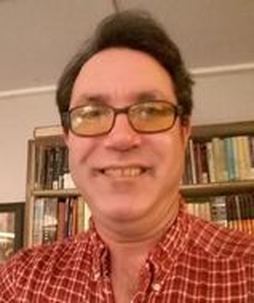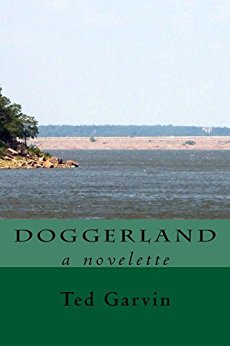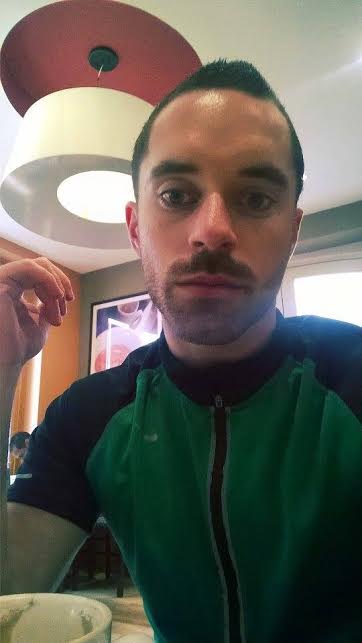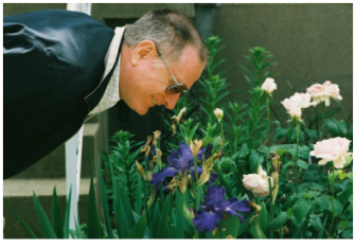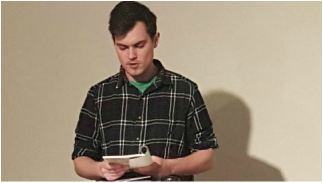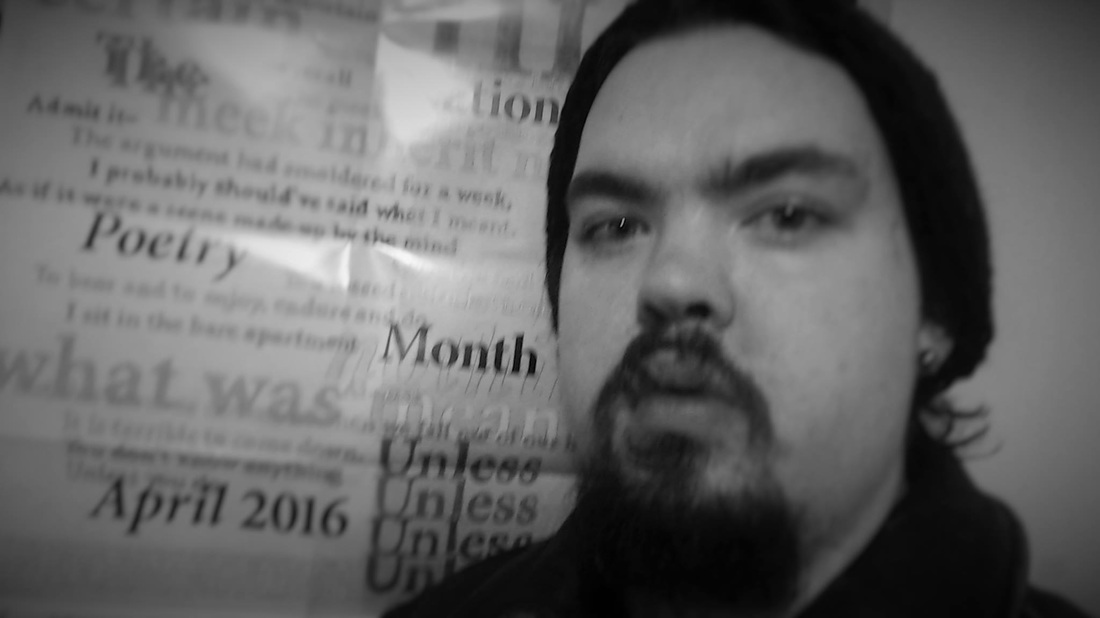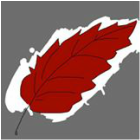INTERVIEW WITH TED GARVINBIO: Ted Garvin, a middle-aged, disabled writer of mixed Native American/European descent, lives in Sapulpa, Oklahoma, with his wife and menagerie. He graduated from the University of Oklahoma with a Bachelor's degree, but that and $2.00 (adjusted for inflation) will buy you a coffee. His favorite authors, in no particular order, are Patrick O'Brian, J.R.R. Tolkien, Roger Zelazny, and Homer. Welcome to Scarlet Leaf Review! Q: Tell us a little about yourself and your background. I am a jack of all trades, but master of none. I have done (almost) every job under the sun—remodeling in its various aspects, debt collection, customer service, tech support, and parenting a special needs child. I have a psychiatric disability, which probably is actually of help in my writing, as obsessive/compulsive behaviors are useful in the arts and may be part of the artistic temperament. I live in the benighted state of Oklahoma. I vote Democratic in elections, but Oklahoma is a “red” state—always Republicans get elected to Congress, etc. Q: Do you think that your school years have had an impact in your writing career? If so, what were you like at school? That's where I learned to write, although I have perfected/improved upon my craft in the ensuing years. Unfortunately, I talk like I write. Q: Were you good at English or like Einstein you excel now in a field that was a nightmare for you as a student? Better at English than Engineering. Q: What are your future ambitions for your writing career? I'd like to be published, make lots of money, and be famous. In my dreams, perhaps. Actually, I'd prefer critical success to commercial. It's always after your death that you're famous, after all. I really want what everyone else wants, to be read and appreciated. Q: Which poets have inspired you and how? What was their impact on your work or your literary perspective? The anonymous author of Beowulf, the Pearl Poet (who wrote Sir Gawain and the Green Knight, among others), and the author of the Cloud of Unknowing. As you can see, I'm big on medieval literature. Q: So, would you mind telling us what you have written so far? Doggerland—a novelette Q: Where can we buy or see them? https://www.amazon.com/Doggerland-novelette-Ted-Garvin-ebook/dp/B01AMOZ9DQ Q: What are you working on at the minute? What’s it about? I'm working on a sequel to Doggerland, tentatively titled the Futility of Vengeance (I'm trying for sexier titles). Q: What genre are your books and what draws you to this genre? Young Adult Historical Fiction (aimed at the older teen—perhaps even the post-teen). My favorite authors are YA authors, like Rosemary Sutcliff and Robert Heinlein's juvenals. Q: What was the name of your last book? Give us an insight into your main character. What does he/she do that is so special? What’s it about? See above. Deccan (the main character of Doggerland), is your typical late Stone Age teen, who wants everything every other teen has ever wanted, but he has a few special concerns—given that he grew up without a father. He wants to know the circumstances surrounding his death? The novel is about what happens when he finds out and then the down-stream consequences (life goes on, you know?). Q: Which actor/actress would you like to see playing the lead character from your most recent book? I've never really thought about it. Someone unknown, probably. Q: How much research do you do for your books? I am fairly well-read. I check out books on my time period from the library and use them as background, but the gist of the novel really comes out of thin air. Fiction is about making things up and too much data put in the book makes it seem a textbook and not a novel. Q: Have you written any other novels/novellas in collaboration with other writers? Why did you do decide to collaborate and did that affect your sales? No. Q: When did you decide to become a writer and why? What was the principal reason for taking up a pen (metaphorical speaking) and write that first sentence? When I was sixteen, but never really pursued it because of parental influence. I took courses on writing in college and have always practiced developing my writing skills. It wasn't until I was in my mid-fifties that I decided I wasn't getting any younger. Q: Do you write full-time or part-time? Do you have a special time to write or do you write every day, 5 days a week or as and when? Depends on what you mean by full time. I don't spend eight hours a day at it, but it's always percolating in my subconscious because I write every day, even Sunday's and holidays. It's an addiction. I spend about an hour or two in the mornings, and then at spare moments, but I have a life. Currently, that involves mowing my yard, tending the garden, and otherwise keeping house. Q: Where do your ideas come from? Or is it just the spur of the moment, a special feeling you experience or a specific conjuncture that offers you inspiration? Out of thin air. I make it up. Q: How do you think you’ve evolved creatively? There is a fine line between creativity and madness—one I cross regularly. Q: Do you work to an outline or plot or do you prefer just see where an idea takes you? I have a hybrid approach. I like to think a few chapters ahead, but I'm pretty much a pantser, then I edit the hell out of it. Q: In your opinion, what is the hardest thing about writing? Thinking stuff up. Q: Now, what about the easiest thing about writing? Editing. Q: Do you ever get writer’s Block and if so do you have any tips on how to get through the dreaded writer’s block? Writer's block, in my view, is a phobia. As we say in this part of the world, you have to get back up on the horse that threw you. There are times when no words will come. I suppose “writer's fatigue” might be a good term, a better term, perhaps, for writer's block. A problem I have is the “this is shit” voice of the critic. The only way to deal with him/her/it is to ignore it. Be kind to yourself. I also don't worry about what kind of weird things come out onto the page. I can always edit it out, after all. Q: Do you read much and if so who are your favorite authors? For your own reading, do you prefer eBooks or traditional paper/hard back books? I read all the time. One author I am hysterical about is Nicola Griffith, who wrote (most recently) a historical fiction work called Hild, about St Hilda of Whitby. Our source for this historical personage is the Venerable Bede, who didn't have much to say about her, leaving quite a bit of room for speculation. Another author I like is Steven Pressfield, most famous for Gates of Fire, which is about the Battle of Thermopylae. I find I get more reading done if it's on my Kindle, because I can read a little at a time, thus filling in those little empty spaces in the day. Q: What book/s are you reading at present? On Becoming a Novelist by John Gardner, Last of the Amazons by Steven Pressfield, the Poetics by Aristotle, and Gotham Writers Workshop: Writing Fiction. Q: Do you proofread/edit all your own books or do you get someone to do that for you? Yes. I'm too poor to hire someone, but I'm somewhat anal retentive, so it's a little easier for me than it might be for some “normal” person. Q: Do you let the book stew – leave it for a month and then come back to it to edit? I know I should. Q: Who edited your last book and how did you select him/her? Me. See the paragraph above about money. Q: Tell us about the covers of your books. How did it/they come about? The cover for the last one, I took a picture I had taken and incorporated it into Amazon's cover designer. Q: Do you think that the cover plays an important part in the buying process? Yes. Q: What would you say are the main advantages and disadvantages of self-publishing against being published or the other way around? With self-publishing, you have to do it all. With doing it the traditional way, you have some professional help. Q: How do you market your books, if you do the marketing yourself? Word of mouth and Amazon's keyword search feature. Q: Would you or do you use a PR agency? Can't afford it. Q: Do you have any advice for other authors on how to market their books? There is a lot of competition out there. My best advice, such as it is, is to write the best damn book you can and let the book sell itself, but you still need to get the word out. Q: What part of your writing time do you devote to marketing your book? Not very much, alas. Q: What do you do to get book reviews? I'm not sure they are all that important. I tried everything I knew to get reviews—give away copies, etc. Q: How successful has your quest for reviews been so far? I have two reviews which just showed up out of the blue. Q: Do you have a strategy for finding reviewers? No. Q: What are your thoughts on good/bad reviews? Paying for reviews is a bad idea. I try not to cry too much over a bad review, but I really don't worry about them. Q: Any amusing story about marketing books that happened to you? No. Q: What are your views on social media for marketing? Which social network worked best for you? Any tips on what to do and what not to do? I'm on Facebook and Twitter, but I don't do much marketing. Q: Did you do a press release, Goodreads book launch or anything else to promote your work and did it work? No. I'm really shy about blowing my own horn. Q: Did you get interviewed by local press/radio for your book launch? No, but I haven't solicited it. . Q: Is there any marketing technique you used that had an immediate impact on your sales figures? Not that I know of. Q: Did you make any marketing mistakes or is there anything you would avoid in future? Talking about my book overmuch to friends and family, other than to mention that it's out there. Q: Why do you think that other well written books just don’t sell? There is a lot of competition. I blame the education system in this country for it, assuming that they don't. Q: What do you think of “trailers” for books? Whiggish innovation. Q: Do you have a trailer or do you intend to create one for your own book/s? No. Q: Do you think that giving books away free works and why? No. Although we live online in a “culture of free”, I think people associate the price with the value of what they're getting. If they're getting it for free, they don't appreciate it. Q: How do you relax? I write. This is effectively a hobby for me, which takes a lot of pressure off. Q: What is your favorite motivational phrase? What is your favorite positive saying? “I must not fear. Fear is the mind-killer. Fear is the little-death that brings total obliteration. I will face my fear. I will permit it to pass over me and through me. And when it has gone past I will turn the inner eye to see its path. Where the fear has gone there will be nothing. Only I will remain.”This shall pass. Q: What is your favorite book and why? I don't really have a favorite book, but I like the Aubrey-Maturin series by Patrick O'Brian. Q: What is your favorite quote? “Badgers? We don't need no stinking badgers!” (movie VHS with Weird Al Yankovich, in case you missed the literary reference) Q: Where can you see yourself in 5 years-time? Hopefully with more published books under my belt. More money would be OK too, but your expenses rise to meet your income, but my income is pretty marginal—tight, not comfortable, but my needs are simple. In a way, the more money you get, the more you want. Q: What advice would you give to your younger self? Don't sweat the small stuff. Q: Which famous person, living or dead would you like to meet and why? Socrates, but I don't speak classical Greek, so we'd have a short conversation. Q: If you could have been the original author of any book, what would it have been and why? I don't envy others. Q: What advice would you give to aspiring writers? Keep at it and damn the critics. Q: Where do you see publishing going in the future? My crystal ball has gotten a little fuzzy, but I'd say that the changes that happened in '07 (or so) when Amazon came out with the Kindle will only accelerate. It's a gold rush. I will say that the people who made the money in the California gold rush of '89 were NOT the miners, but the people who sold stuff to them, like Levi-Strauss. Q: Is there anything else you would like to add that I haven’t included? No, this was pretty comprehensive. Q: How can readers discover more about you and you work? Website: http://tedgarvin.com (until it goes down because I can't see that it is anything other than a time sink) Facebook: https://www.facebook.com/ted.garvin.3 Twitter: https://twitter.com/for_all_love Amazon Author Page: https://amazon.com/author/tedgarvin Smashwords: Book Links: https://www.amazon.com/Doggerland-novelette-Ted-Garvin-ebook/dp/B01AMOZ9DQ Goodreads: https://www.goodreads.com/author/show/14807753.Ted_Garvin?from_search=true Thank you very much for taking the time out of your busy schedule to take part in this interview.
0 Comments
INTERVIEW WITH NEIL SLEVINWelcome to Scarlet Leaf Review! Q: Tell us a little about yourself and your background. I am a 26-year-old writer from the West of Ireland. An English teacher, in 2015 I returned to university to complete an MA in Writing at NUI Galway and to pursue a writing-based career. I write for Sin (NUI Galway's student newspaper), editing its entertainment section and culture column, Resonate, and as Events Reporter for the Institute for Lifecourse and Society. My poetry has been published by The Galway Review and numerous international journals, including Scarlet Leaf Review and Artificium: The Journal. Q: Do you think that your school years have had an impact in your writing career? If so, what were you like at school? I do. I loved writing creatively even in primary school, and my secondary school experience developed that passion for me. English was my favourite subject, alongside PE, and I enjoyed our classes a lot. We often wrote for and during them, and I was usually called on to read mine to the class. It was good training for a career in writing; I always knew I had to turn up with something worth sharing. I was quite studious, but also sporty. I tried my hand at everything and enjoyed being there most of the time. That was a big part of me wanting to become a teacher. Q: Were you good at English or like Einstein you excel now in a field that was a nightmare for you as a student? I was always good at English, but I wasn’t ‘great’ (if I’m even allowed to say I am now!) until I got towards the end of my time at school. I remember taking it more and more seriously from 2nd year onwards, however, and it was easily my best subject by the time it came to Leaving Cert. Q: What are your future ambitions for your writing career? Right now, I would like to be able to live off my writing-based work – editing, journalism, publishing, teaching, etc. Beyond that, I want to have my poetry collections (The Letters I Never Sent and I Am being the two I have in the pipeline right now) published in Ireland and internationally, then perhaps pursue both fiction non-fiction more seriously. Q: Which poets have inspired you and how? What was their impact on your work or your literary perspective? As an Irishman, WB Yeats and Seamus Heaney, obviously, impacted me via their influence and lyricism; Patrick Kavanagh with his work’s simplistic beauty. The depth and darkness of Sylvia Plath’s poetry struck me, even as a teenager, while, in more recent years, I’ve also enjoyed Simon Armitage’s very frank worldview. I think it too early to say how these poets have affected my work, but I often recognise the traces and influence of writers I’ve read and returned to when I revisit my work from different times in my life. Q: So, would you mind telling us what you have written so far? (*Include books, novellas, short stories, poems, blogs, awards or anything of interest.) I’ve written poetry mainly so far, approximately 100 poems, of which I’m happy with roughly 40. These will form the bulk of my first two collections. Since 2015, I’ve dabbled in fiction, writing a series of flash pieces inspired by my youth, a fable, and the opening of a novel. I write 6-word stories at sixwordmemoirs.com and have done so as ‘NeilSlevin’ for three years now. Finally, I’ve worked as a reporter and journalist for the past year and written a number of news, feature, entertainment and sports articles. I must get around to writing some lifestyle pieces. Q: Where can we buy or see them? (*include American, European and any other relevant links. Free, free promotions or prices can be included) You can read much of my poetry on Scarlet Leaf Review’s website, as well as in various Irish and international literary journals, but my fiction remains hidden on my laptop! You can read a lot of my journalism in last year’s edition of Sin Newspaper, and on the Lifecourse Institute’s website. Q: What are you working on at the minute? What’s it about? At the minute, I’m working mostly on my final submission for my Writing MA at NUI Galway. It consists of almost 40 poems and three fiction pieces. Q: When did you decide to become a poet? What was the decisive factor or you just took a pen and starting writing poems? I can’t describe my writing poetry as a result of any conscious decision I made. Poetry is more how it comes out for me. At school, my prose was quite purple and poetic, and as an adult, writing my first poem was quite a natural step. The first attempt I made at writing poetry was a poem called ‘Trainspotting’, about my first experience on the Tube in London. Q: What makes you write? What’s the force behind taking your pen (or your keyboard) and put verses down? I write when inspired to by my thoughts, feelings and observations, sometimes by things I happen on in conversation. What makes me write is often a desire or need to make sense of what I’m thinking and feeling. I also enjoy writing in response to prompts, interesting or unusual things that people say, or as part of a class or group. Q: Do you write full-time or part-time? Do you have a special time to write or do you write every day, 5 days a week or as and when? It changes from week to week. These past 12 months have been my first focused period as a writer. Right now, I enjoy focused periods of work, say a month or 6 weeks, where I write daily then edit and refine what I’ve produced during my down-time, but this may change once I return to working full-time. Ideally, I like to write for an hour a day every day, no more no less, and see what I come up with. I prefer short, sharp bursts of activity over days spent at a laptop. Q: How do you think you’ve evolved creatively? It’s still a little too early to say, but I’m enjoying working through my portfolio and seeing how my writing has evolved and continues to evolve in terms of style. I think my poetry has become more direct and concise, while my fiction is still at a stage where I can be influenced and inspired to write in different ways by what I’ve read and enjoyed. Q: In your opinion, what is the hardest thing about writing? Generating the ideas for writing and believing in them enough to get them down on paper. Q: Now, what about the easiest thing about writing? The drafting and editing process of a piece. I really enjoy writing once I have the inspiration to. Q: Do you ever get writer’s block and if so do you have any tips on how to get through the dreaded writer’s block? I’m not sure I believe in writer’s block per se. If I have an idea I believe in and want to pursue enough to make something of it, I’ll write about it. On the other hand, having a routine and following it can only help a budding writer. Write as often as you can for a fixed period of time; the more you write, the better you get. Q: Do you read much and if so who are your favorite authors? For your own reading, do you prefer eBooks or traditional paper/hard back books? I’m not reading a lot at the moment, but Harry Potter and the Cursed Child is at the top of my to-read list. I much prefer reading by traditional means. Q: How do you relax? Exercise, coffee, music, reading and spending time with friends. Q: Where can you see yourself in 5 years’ time? I don’t have any fixed vision at the moment, but I want to see myself published, working in or with writing and/or at third level and, ideally, pursuing my PHD. Q: What advice would you give to your younger self? I think I’d encourage my younger self to take things a little less seriously, to be more open to different opportunities and to take more risks. Q: What advice would you give to aspiring writers? Live a life worth writing about. Q: How can readers discover more about you and you work? I shamelessly self-promote via my Twitter account: https://twitter.com/neil_slevin Thank you very much for taking the time out of your busy schedule to take part in this interview. Dear Readers,
It is the time to announce the prizes for the July issue. We will not bore you with too many details, therefore, we will let you know only that between January 15th 2016 and August 14th 2016, inclusively, we have had 240,019 hits on this site, and for the July issue we had 45,347, and for that we have to thank you both: the readers and the authors. So without too much ado: POEMS: I. KEN ALLAN DRONSFIELD 1,387 READERS II. FALEEHA HASSAN 1,270 READERS III. ABU SUFIAN 1,321 READERS SHORT-STORIES I. WILLIAM QUINCY BELL 1,307 READERS II. N.T. FRANKLIN 1,297 READERS III. RICK EDELSTEIN 1,202 READERS NON-FICTION ABU SUFIAN 1,525 READERS Thank you all! Scarlet Leaf Review Staff Hello Dear Readers, On August 15th, 2016, at 4:30 a.m, as always, the new issue of this literary review will be live, filled with excellent poems, stories and real stories, which, we hope, will offer you moments of pleasure, relaxation and delight. We have had the chance to feature many good authors and not only in this issue. Many of them are already very well known and some of them are emerging authors and believe us, they show a lot of promise. But, better yet, read their work and judge for yourself. As a theater actor or actress measure the quality of their work through the applauses exploding in the theater hall, an author will have to be told that their work brought something to you, so, please, really, pretty please, leave them a comment if you enjoyed their lines. We have enjoyed them and that's why we decided to publish them. Have fun with this issue! And let us know what you think of the authors' hard work. We thank you for supporting our authors and our review by reading it. Just have fun! Scarlet Leaf Review Staff INTERVIEW WITH DONAL MAHONEY BIO: Donal Mahoney, a native of Chicago, lives in St. Louis, Missouri. He has worked as an editor for The Chicago Sun-Times, Loyola University Press and Washington University in St. Louis. His fiction and poetry have appeared in various publications, including The Wisconsin Review, The Kansas Quarterly, The South Carolina Review, The Christian Science Monitor, Commonweal, Guwahatian Magazine (India), The Galway Review (Ireland), Public Republic (Bulgaria), The Osprey Review (Wales), The Istanbul Literary Review (Turkey) and other magazines. Some of his work can be found at http://eyeonlifemag.com/the-poetry-locksmith/donal-mahoney-poet.html#sthash.OSYzpgmQ.dpbs (Photo: Carol Bales) Welcome to Scarlet Leaf Review! Q: Tell us a little about yourself and your background. I was born to Irish immigrant parents in Chicago many years ago. My mother had been raised with eight other siblings on an English landlord’s farm in a house with no heat, only a fireplace. Her family planted and harvested cabbage, rutabaga and potatoes for the Englishman. She left because of poverty and no future, My father, reared on a dairy farm in Ireland, was expelled from the country by his English captors for running guns for the Irish Republican Army shortly after the Rebellion of 1916. He had been imprisoned for a couple of years. He was a teenager when caught and in his twenties when put on a boat for America. My father came here as a grave-digger, boxer and singer in Irish nightclubs till he caught on with the Edison Company in Chicago and learned his trade, He did not live long enough to see his grandson, my son, win a Rhodes Scholarship to Oxford University in England. He would not have been happy having a grandson of his studying in detested England. My mother may have had a fourth grade education and my father a sixth grade education but he was able to help me with algebra in high school. A sober Irishman, he saved enough money to send me to college when there were no loans. He was not happy to see me major in English, not go to law school, and then go on for a master’s in English. In a house like that I grew up not too fond of the English. And now many decades later I cannot say that I am any fonder of them although I thank them for their contribution to literature in the English language. Q: Do you think that your school years have had an impact in your writing career? If so, what were you like at school? I was a nitwit in grammar school, always involved in mischief, not much good in math but I could spell and write. I had nuns, God bless them, who took the sons of immigrants and educated them in spite of themselves. They never penalized my academic grades because of the commotion I caused in the classroom. I remember my father telling me once that I was lucky that he and my mother came to America speaking English, albeit with a thick brogue. The other kids in my classes often came from other European countries and spoke Polish, Lithuanian, German and other languages at home so for them English was almost a second language. For me, English was the only language I knew, fraught as it was with hyperbole and often still is Q: Were you good at English or like Einstein you excel now in a field that was a nightmare for you as a student? I was always good in English but had to study in math and science, neither of which did I care for. But if I studied, I did fairly well. Q: What are your future ambitions for your writing career? I can’t say that I have any future ambitions as a writer, only to write up until the day that I die. I quit writing for 35 years or so because of jobs as a print editor that took most of my energy. My five kids always got hungry. And I wanted them to go to school as I had gone to school. They did and now have families of their own. In the Sixties, when the jobs were easy, I had about 100 poems or so published in what were called “little magazines” as well as university magazines and at least one commercial magazine. Then I got my first job as the editor of a small national magazine. I was the staff, no one else. So I quit writing my own stuff and got the magazine out every month. I returned to writing in 2008 following retirement when my wife bought me a computer as a gift and showed me where cardboard boxes of poems and drafts of poems had been gathering dust in the basement. In addition to poems, I began writing fiction and nonfiction as well. At last count, I have had the good fortune to appear, counting reprints, more than 6,000 times in print and online with poems, stories and essays. But all I do now is write all day. Q: Which poets have inspired you and how? What was their impact on your work or your literary perspective? When I was young, T.S. Eliot and Wallace Stevens impressed me greatly. As an adult it was the Irish poet Seamus Heaney, who won the Nobel Prize for Literature, who grabbed my attention because his diction mirrored the diction of the Irish immigrants with whom I was raised. Q: So, would you mind telling us what you have written so far? Although I have the quantity and some say the quality to have produced books of poems and maybe a book of short stories, I have not tried to put a book together because I like writing but not editing and compiling a book would remind me too much of work that I did for so many years. I also lack the patience to try to sell the book to a publisher and the idea of going to a vanity press does not appeal to me personally. Q: What are you working on at the minute? What’s it about? I write up to nine hours a day in perhaps three hour shifts on poems, stories and essays. I might have as many as four poems in work at once and send each out only when I give up on making them any better. If I’m working on a story or essay I try to stick with it because that seems to occupy some other part of my brain. I “hear” poems. Prose I have to write. Q: When did you decide to become a poet? What was the decisive factor or you just took a pen and starting writing poems? I never decided to become a poet. My father spoke a musical English and that affected me, I’m certain. Perhaps the first “verse” I ever wrote was in third grade simply because I liked the sound of it. Q: What makes you write? What’s the force behind taking your pen (or your keyboard) and put verses down? I have no idea what makes me write except that it is one of three obsessions I have had in life. The other two might have gotten me arrested, if caught, or made me sick had I not managed to quit both of them. Q: Do you write full-time or part-time? Do you have a special time to write or do you write every day, 5 days a week or as and when? Because I am retired I write 7 days a week usually in three three-hour shifts a day unless doctor appointments or something else tears me away from the computer. Q: Where do your ideas come from? Or is it just the spur of the moment, a special feeling you experience or a specific conjuncture that offers you inspiration? I have no idea where my ideas come from except to say that a phrase that sounds good will pop into my mind. For example, the other day I remembered how when I was small my father, when he was upset, would go around the house chanting “the bog above Bob Gordon’s bog,” which I always assumed was something from his childhood in Ireland. I never found out what it meant but I finally tried to get it out of my mind by using it in a poem that I had no idea at the start what it might be about. It turned out to be a ditty. I write ditties to get rid of phrases that won’t go away but sometimes good poems start the same way. I never know where a poem is going until it is written. This link will take you to the ditty that resulted: http://www.thepoetcommunity.com/8539/above-bob-gordons-bog-a-poem-by-donal-mahoney Q: How do you think you’ve evolved creatively? I have no idea except that I always loved words, the sound of them bumping into each other, as the immigrant Irish spoke them in Chicago. They were the only discipline that I was attracted to because until graduate school I really did not have to work too hard and that was fine with me because I loved basketball and general mischief and commotion. Q: In your opinion, what is the hardest thing about writing? Not knowing when a poem is “done,” But even when a poem is done, it really isn’t because as some famous poet once said, “A poem is never done. It is simply abandoned.” For me the main problem is running on. Not quitting when I should. Not editing myself the way I edited others to make a living. Although I quit drinking on 11-23-61, verbally I am always drunk. Q: Now, what about the easiest thing about writing? The computer that replaced the typewriter that I was weaned on. The delete key beats an eraser. Q: Do you ever get writer’s Block and if so do you have any tips on how to get through the dreaded writer’s block? I have never had Writer’s Block. I suffer from dysentery of the mind. Q: Do you read much and if so who are your favorite authors? For your own reading, do you prefer eBooks or traditional paper/hard back books? I read many books in grammar school, high school, college and graduate school. In grammar school, I would go to the library and bring home bags of books. I then read for pleasure. Majoring in English made me read because I had to. I now read periodicals in print and sites online. No books in a long time. But the book that changed my life in 1958 was J.D. Salinger’s “The Catcher in the Rye.” It probably cost me a law degree because I was headed to law school till I read that book. Q: What book/s are you reading at present? No books but a ton of magazines. Q: Do you proofread/edit all your own books or do you get someone to do that for you? I have dry macular degeneration, which is why I type in bold so as to catch as many typos as I can. My wife proofs everything for me now. Her comments on my poems are also helpful because she is a journalist and reporter by trade and approaches poetry from a different angle. Q: Do you let the book stew – leave it for a month and then come back to it to edit? If I can manage to do so, I leave a poem draft marinate overnight after revising it probably 10 or 12 times during the original writing. The older I get the less I like to let anything hang around. I like to say enough. And that is not a wise thing to do. Prose is different because I write prose. I hear poems and type them out if that makes any sense. Q: Who edited your last book and how did you select him/her? The only “editor” I have is my wife who comments on poems, stories and essays while proofing them. Q: Do you think that the cover plays an important part in the buying process? Absolutely but often for the wrong reasons. Q: What would you say are the main advantages and disadvantages of self-publishing against being published or the other way around? I would only self-publish if I wanted to leave hard copies of my stuff for my kids. But that would involve a lot of work that does not interest me. Q: How do you market your books, if you do the marketing yourself? I have never thought about my writing as a way to make money so many but not all of the following questions are not for me to answer although I understand their importance. Q: Would you or do you use a PR agency? If I were a commercial writer, I certainly would. Q: Why do you think that other well written books just don’t sell? I fear books, magazines, newspapers and most print material are in a terminal state and will reside only in libraries. Q: How do you relax? I seldom relax and when I do I’m likely asleep Q: What is your favorite book and why? The Bible Q: What is your favorite quote? “I am the Way, the Truth and the Life.” ----Jesus Christ Q: Where can you see yourself in 5 years-time? Still alive, I hope, and writing Q: What advice would you give to your younger self? Don’t be so full of yourself. Q: Is there anything else you would like to add that I haven’t included? I think one of the most important aspects of my life that I have failed to discuss is attending Roman Catholic schools for 19 consecutive years without ever thinking about being a priest. I then did not practice Catholicism for 40 years, only to return to the Church eight years ago. One either has faith or does not. I have always believed even when I was not practicing my faith. Believing for me is like breathing and writing, They come naturally and I thank God for them. Q: How can readers discover more about you and you work? Website: http://eyeonlifemag.com/the-poetry-locksmith/donal-mahoney-poet.html#sthash.OSYzpgmQ.dpbs= and http://booksonblog12.blogspot.com Thank you very much for taking the time out of your busy schedule to take part in this interview.
|
ISSN 2369-8446
To bring joy to readers everywhere. Archives
June 2023
Categories
All
http://roxananastase.weebly.com/
|
